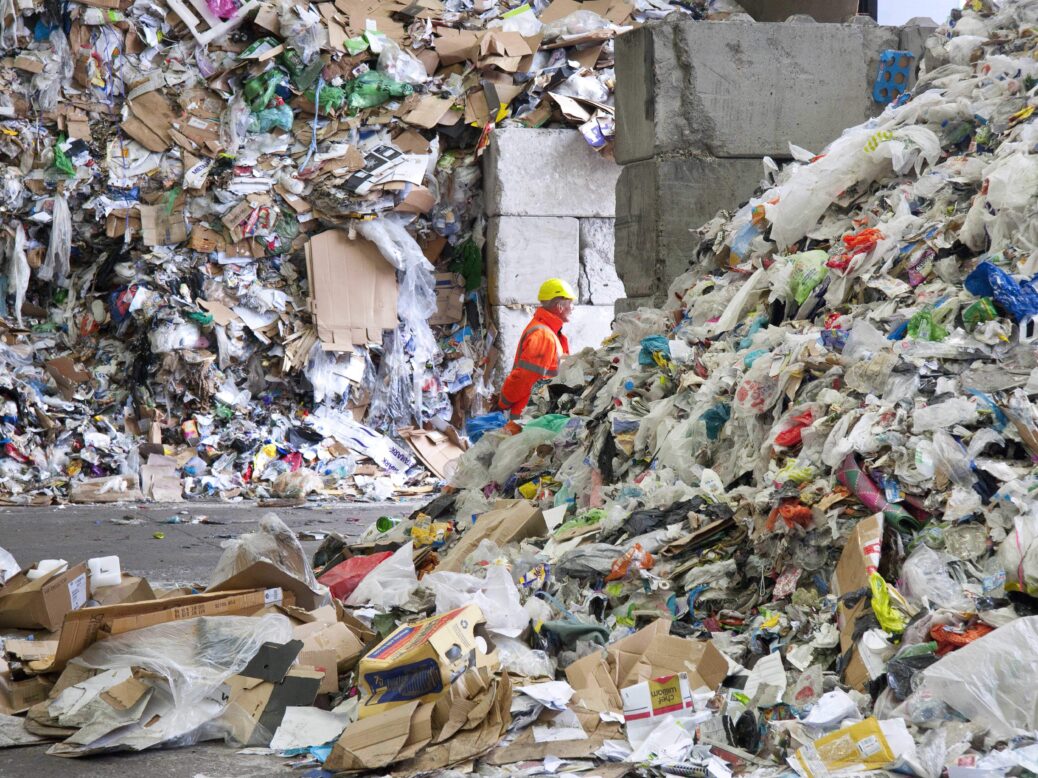
I am rooting through a sack of rubbish. Used tissues, half-eaten biscuits, a lollipop, teabags, rubber gloves, a sorrowful blue gobstopper rolling around like Earth in a galaxy of trash. No, the New Statesman hasn’t sent me rummaging through the bins of an unsuspecting celebrity. It’s art.
The Rubbish Collection is an exhibition opening this week at the Science Museum, which invites visitors to sort through bags of its rubbish over the period a month. Giant photos are taken of the refuse, which is sorted on pristine, white operating table-style plinths, and a constantly-updating montage of all this waste is beamed onto a giant screen underfoot.
Notable items – toys, a bag of drugs, cologne, cash, shoes – are picked out by the artist’s assistants, who, in their identical grey jumpsuits and black rubber gloves at each sorting station, give the space a slightly dystopian air.
The idea is that, after one month’s rubbish sorting and snapping, the materials will be brought back to the exhibition space once they’re partially through the cycle of being processed – paper bales, giant piles of ash, steel ingots, compacted cubes of plastic bottles. These will be displayed among the quirkier items found amongst the rubbish, to present the stories, and often the mystery, behind what some people bin, as well as the sheer volume of how much we waste.
Museum visitors gather round each sorting station in a room at the back of the museum. It only opened to the public Monday, but already that warm, sweet scent of bin-juice dangles in the air. I sign a disclaimer saying I won’t sue if I contract some malevolent virus from a yoghurt lid, put on some latex gloves and a plastic apron, and get stuck in. My rubbish bag is all tissues and teabags, soggy cookies and sticky sweets. I look enviously over at the next table, where a man is happily sorting a bag full of clean, colourful files and folder dividers.

Your reporter, engaging in the age-old journalistic
practice of rummaging through bins
The difference between items on each the white tables is fascinating, and it’s difficult to fathom how some made their way into the museum’s bins.
“We’re only on day two and we’ve found real money, £5 and 8p so far, we’ve found a whole pile of drugs, chemist drugs, basically a medicine cabinet of drugs,” laughs the exhibition’s artist Joshua Sofaer.
“We’ve had completely usable things, like a bowl. Perfectly fine, it should’ve just been washed and put back in the cafe. Half-eaten yoghurts with the teaspoon that the mum’s put in with the yoghurt that the child was clearly supposed to bring back and they were probably told: ‘bring back the teaspoon!’ I think it’s more about the stories than the objects; it’s about imagining who’s discarded these things and what they’ve discarded.”
Other baffling items are hundreds of springs, a pair of black leather shoes with apples lodged inside them, and toys presumably from the gift shop still in their packaging.
I ask Sofaer if, in the same way producers of harrowing nature programmes aren’t allowed to dive in and save plaintively wailing baby elephants, he is restricted from rescuing anything from the incinerators.
“Yep, we can’t do it! If it’s in general waste, it will go back into general waste before it leaves the building and it will be incinerated,” he says.
I notice there are toys that children have clearly tossed away by mistake, which one visitor looks particularly distressed about when looking through the trash.

The artist Joshua Sofaer looking through a bin-bag at one of the sorting stations in the exhibition. Photo: Copyright the Science Museum
Sofaer has worked with rubbish before, on the Scavengers project at Tate Modern, made a “library of rubbish” in Japan, and also worked with Brazil’s catadores, human scavengers who find value in what people discard.
“The initial thing that perked my interest in rubbish wasn’t really an environmental or green reason, it was more that I was interested in the idea of the ready-made, and how objects accrue value the second that they’re brought into a museum,” he tells me. “You buy paints for a few pence and you apply them in a certain way and the canvas is worth millions. I was interested in the process of how something that was worth nothing becomes worth something because of the context of a museum.
“And so initially when I became interested in rubbish, it was around these issues of money and value and status, and tried to flip the common-sense assumption about what something is worth that is thrown away, and the status the museum or the gallery accords to those kinds of objects.”
However, he now despairs at how much we waste as the human race, and his respect for what lands in our bins has now manifested itself in his own household:
“For me, personally, it’s kind of really transformed how I deal with my rubbish. I find it very very difficult now to just throw stuff away. A little bit too much I would say… I really religiously wash my rubbish before I put it in the recycling. I’ve been to the recycling plants, I see the problems they have, and I know what good rubbish should look like. So there is not even a trace of tinned tomato on my tinned tomato tins once I throw them out! Maybe I take it a little bit too far.”
The Rubbish Collection, Science Museum, London. Open until 14 September 2014





